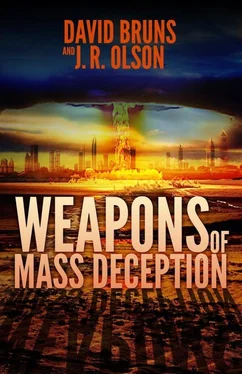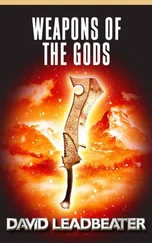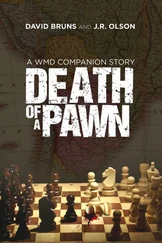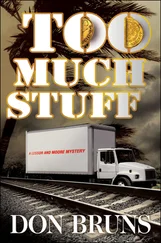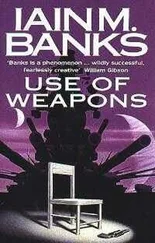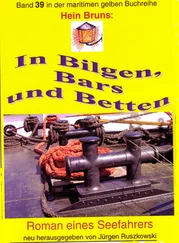David Bruns, J. R. Olson
Weapons of Mass Deception
Northeast Iraq, near the Iranian border
15 March 2003 — 0200 local
The Iranian was late.
Uday Saddam Hussein al-Tikriti shifted in the backseat of the black Range Rover. His face was calm, but inside he raged. He checked his Rolex again — the fifth time in as many minutes.
0200. Two hours! This Iranian asshole has kept the son of Saddam Hussein waiting in the desert for two hours!
He sniffed and wrinkled his nose. The bodyguards on either side of him, hulking men dressed in worn army fatigues — as per the Iranian’s instructions — averted their eyes. The two men in the front seat stiffened and stared straight ahead.
“Out,” Uday barked to the one on his right. “I will walk awhile.”
“But, sir, the—”
“Shut up and let me out!” First they fart in his car, then they try to stop him from getting fresh air.
Stay calm. Father trusted you with this mission — not Qusay — because you are the favored son. Keep it together.
He brought his voice down to a conversational level, but kept the edge of authority. “You will walk with me, Baseer.” His head of security exited the front passenger seat and waited for Uday to join him. The mountain air was sharp and clear after the stuffiness of the Rover. Uday breathed deeply, watching his breath steam when he released it. The very thinnest of crescent moons hung above them, casting a silvery sheen over the landscape. He moved to the Kia 2.5-ton truck, noting that the Iraqi Army emblems had been sanded off and the doors repainted.
He nodded to the men in the rear, waving his hand for them to stay seated when they tried to scramble to their feet. Most of the space in the truck bed was taken up by the cargo, plain wooden boxes lashed securely to the deck. Again, per the Iranian’s instructions.
Why did his father even listen to this man? During the conflict CNN called the “Gulf War,” when the Iraqi airfields were being pummeled by American bombers, this same man convinced his father the Iraqi Air Force would be “protected” in Iran. One hundred thirty-seven Iraqi fighter jets were flown to Iran. One hundred thirty-seven fighter jets never returned home to Iraq. War reparations, the Iranians claimed. Why would his father trust such a man?
He knew the reason: Saddam was afraid. Fighter jets were toys compared to what was in these plain wooden crates: weapons that would turn the world against him, if they were discovered on Iraqi soil.
No, Saddam had seen the Americans enter Afghanistan. Uday had watched his father obsessively flip the channels of his massive TV between Al Jazeera and CNN, sometimes watching both at once. He had seen the Americans lobby the United Nations with their pictures and their money and their threats. Saddam knew in his heart that it was only a matter of time. The Americans were coming, and this time they would not stop at the border.
Still, it made Uday’s heart ache to think of the money they had sunk into the contents of these boxes. Had the crates been made of solid gold, they would not represent a tenth of the treasure they had spent. These few boxes represented decades of work. The smuggling costs alone to move the equipment into Iraq had been enormous — and that was before they’d built a single bomb. Uday let his eyes run over the boxes and the handful of men guarding them. A hot flush of anger rose in his throat.
And now they were giving it to the Iranians for safekeeping.
He shook his head, annoyed with his daydreaming. The men eyed him nervously. Most of them had never even seen Saddam, or his sons, in the flesh. The ten men in the Kia had no idea why they’d been selected for this mission and no idea what was in the crates.
With a final nod, Uday turned on his heel and strode past the Kia, hands clasped behind his back. The roadside ended in a steep cliff. He peered over the edge of the fifty-foot drop. He couldn’t see the bottom, but he heard the trickle of water.
The mountain on the other side of the Kia climbed up less steeply in a jumble of rocks and shadows. He heard the distinctive yipping of a golden jackal in the distance, a sound any son of the desert would recognize immediately. They hunted at night, pursuing rodents or rabbits, and the occasional kid goat if the young shepherds weren’t vigilant.
The sound of an approaching vehicle interrupted his thought. Finally! A black SUV rounded the bend at a crawl, lights extinguished. It came to a stop fifty feet from Uday, its exhaust smoking in the night air. Uday shot a hand signal to Baseer and began to walk slowly toward the new vehicle.
Behind him, car doors slammed as his protection detail — the four men he trusted most on the planet — fanned out to either side. He walked boldly up to the passenger’s side door and put his hands on his hips to show the Iranian his displeasure at being kept waiting in the cold, filthy desert for two hours.
He could make out only two figures in the vehicle. A light flared in the passenger seat as someone took a drag on a cigarette. That must be him , Uday thought. The man smokes like a chimney, his father had told him, laughing at his use of American slang. He’s never without a cigarette in his hands. Uday composed his face into an expression of irritation.
The purr of the lowering window seemed loud in the stillness of the night. Uday opened his mouth to speak just as the cigarette flared again. He choked back his outrage when he saw the man’s face.
It was a handsome face, high cheekbones, noble nose and brow, strong jawline. His neatly trimmed dark hair was shot with distinguished gray and brushed straight back from his forehead. And yet there was a shadow behind the dark eyes that offset the handsome features. A shadow that made Uday, who as Saddam’s son had seen and perpetrated all manner of evil in his life, fake a cough and avert his eyes from the man’s gaze. The Iranian’s brow twisted in what might have passed for sympathy. He held out a pack of cigarettes. Marlboros.
“Cigarette?” he asked.
The tenor voice was soft, tender, but it gave Uday a chill nonetheless. Uday shook his head and stepped away as the car door opened.
The Iranian was slim of build and slightly stoop-shouldered. He stretched, the lighted tip of the cigarette arcing into the sky as he reached his arms over his head.
Uday looked from the Iranian to his driver, who had not moved from behind the wheel of the Rover. “You brought only one man with you?”
The Iranian gave a low chuckle and brought his wrist to his lips, muttering a short burst of Farsi. The rocky shadows shifted as a platoon of heavily armed men moved into the clearing. Uday’s heart skipped a beat. Iranian commandos.
Aware that his own men were watching him and desperate to regain some control of the situation, Uday adopted a tone of outrage. “How dare you?” he hissed in English, the tongue common to both men. “You bring these men into my country—”
The Iranian stepped close, so close Uday could smell the man’s aftershave and the dead taint of cigarettes on his breath. “I am a cautious man, Uday, a trait you would do well to emulate. Stop this posturing and show me the weapons you need me to hide from the Americans.” His voice was pitched low, for Uday’s ears only, and his warm breath puffed against Uday’s cheek as he spoke. He wheeled away and walked toward the Kia.
Uday followed, trailed by his four-man security team. Four of the Iranian commandos were still in place, weapons trained on the Iraqi contingent, mirroring their movement toward the big vehicle. The rest had disappeared.
The Iranian reached the back of the truck and said in flawless Arabic, “Get out.” The ten soldiers, without waiting for a confirming order from Uday, piled out of the truck. The Iranian waited until they were herded away before he hoisted himself into the back of the Kia. One of his commandos came forward with a crowbar and a flashlight. He lowered the tarp across the back entrance and positioned himself between the truck bed and Uday’s people.
Читать дальше
